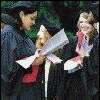 |
|
The Transformation of Cities in the Global Era: York U. Scholars Win $2.4-Million From SSHRC to Study Toronto, Dublin, Montreal & Berlin
At this crucial stage in our social evolution, a team of international scholars led by York University social scientist Alan Blum will attempt to answer these questions, looking at the cities of Toronto, Montreal, Berlin and Dublin. "We need to understand how important a sense of place is in our communities and how rapid global economic and technological change is affecting that," says Blum. "It is essential to human growth and to the health of our societies that we determine how to preserve this sense of place and deal with global changes on local terms."
The project has been awarded a $2.4-million grant over five years from the Social Sciences and Humanities Research Council of Canada (SSHRC), under its Major Collaborative Research Initiatives (MCRI) program. It will bring together eminent scholars in economics, sociology, urbanology, anthropology, philosophy, law, literature and the visual arts. Participating universities around the world will contribute an additional $1-million to the project. The completed research will be released in a six-volume series of books, beginning next year with a comparison of the societies of Toronto and Montreal. Studies will also be released on a gradual basis at conferences, in special issues of academic journals, and in film and video projects.
This ground-breaking look at urban life in all its facets represents a major departure from traditional modes of urban study as a simple function of politics, economy and ecology, says Blum. He says the studies will embrace culture as the driving force of city life and the lens through which we understand it. "We want to know how a city, with all its distinct social groups, hangs together," says Blum. "Globalization appears to be producing a more urbanized world, making cities more important than ever as centres of power, each striving to make their mark as Žplayers' in the world market. But urbanity itself may be disappearing as a powerful notion in social life." Blum says this is reflected in crises over the commodification of social values, the primacy of efficiency, the loss of civility and the lack of connection between different groups in the social mosaic. "Toronto is an interesting cultural mosaic, but what kind of a society is it if its component cultural groups do not connect," he asks.
Blum says the cities of Toronto, Montreal, Dublin and Berlin were chosen because they each have the clear social divisions -- the variety of values and lifestyles -- typical of most big cities, and because they are Žsecond tier' cities, not primary global centres. They also have recently experienced intensive building or re-building activity and demonstrate concerns about technological expansion and its effects on city life.
Blum emphasizes that it is the deeply embedded cultural traditions of a city that ultimately shape its identity and its citizens' pride of place. He also notes that there is a tension today between the ideas of world citizenship and loyalty to place. "Commercial advertising praises Žone world', emphasizing the negative implications of any distinction as discrimination, stereotyping or bad nationalism, and affirming the idea of the world citizen. Yet, a world citizen without a sense of place could be spaced-out," says Blum.
"We are interested in Montreal not only for the divisions inherent in the issue of Quebec separatism, but for the way it deals with loyalty to the city in the face of such diversity, and in Toronto, too, for the ways it seeks to manage its diverse groups and neighbourhoods in a Mega-city form." Blum says Dublin is a graphic example of the collision of strong senses of place and locality with modern demands as that city is almost re-created from a place with strong village traditions into a modern urban economy. The transformative currents underway in Berlin since the collapse of the Berlin Wall are well documented.
Blum will direct 23 co-investigators including York professors Ioan Davies (co-director), Ken Little (anthropology), Janine Marchessault (film and video) and James Porter (sociology). Both Blum and Davies have done extensive work on social theory and its applications to problems of city life. Davies has researched African cities and has laid the groundwork for the Dublin studies on a number of recent trips. He was a visiting professor and researcher in Japan last year where he studied its cities. Davies will focus his research on social divisions within the city, particularly in relation to its fine arts and cultural life. Blum is continuing to apply social theory to the forms and practices of urban life where there are conflicts over the meaning of place in everyday activity, such as in architectural innovations, building and rebuilding activities, and the legal organization of the city. He began researching these areas in Berlin and Milan.
SSHRC's Major Collaborative Research Initiatives program funds large-scale projects that promote collaborative research and research networks across disciplines that meet international standards of excellence, provide opportunities for training students and young researchers in a collaborative environment, and promote the development of partnerships between universities and private and public sector groups.
For further information, please contact:
Alan Blum
Ioan Davies
Ken Little
Janine Marchessault
James Porter
Susan Bigelow |
|
|
| | Welcome to York University | Latest Release | Release Archives | |
![[to York's Home Page]](../../images/yorklogos.gif)
